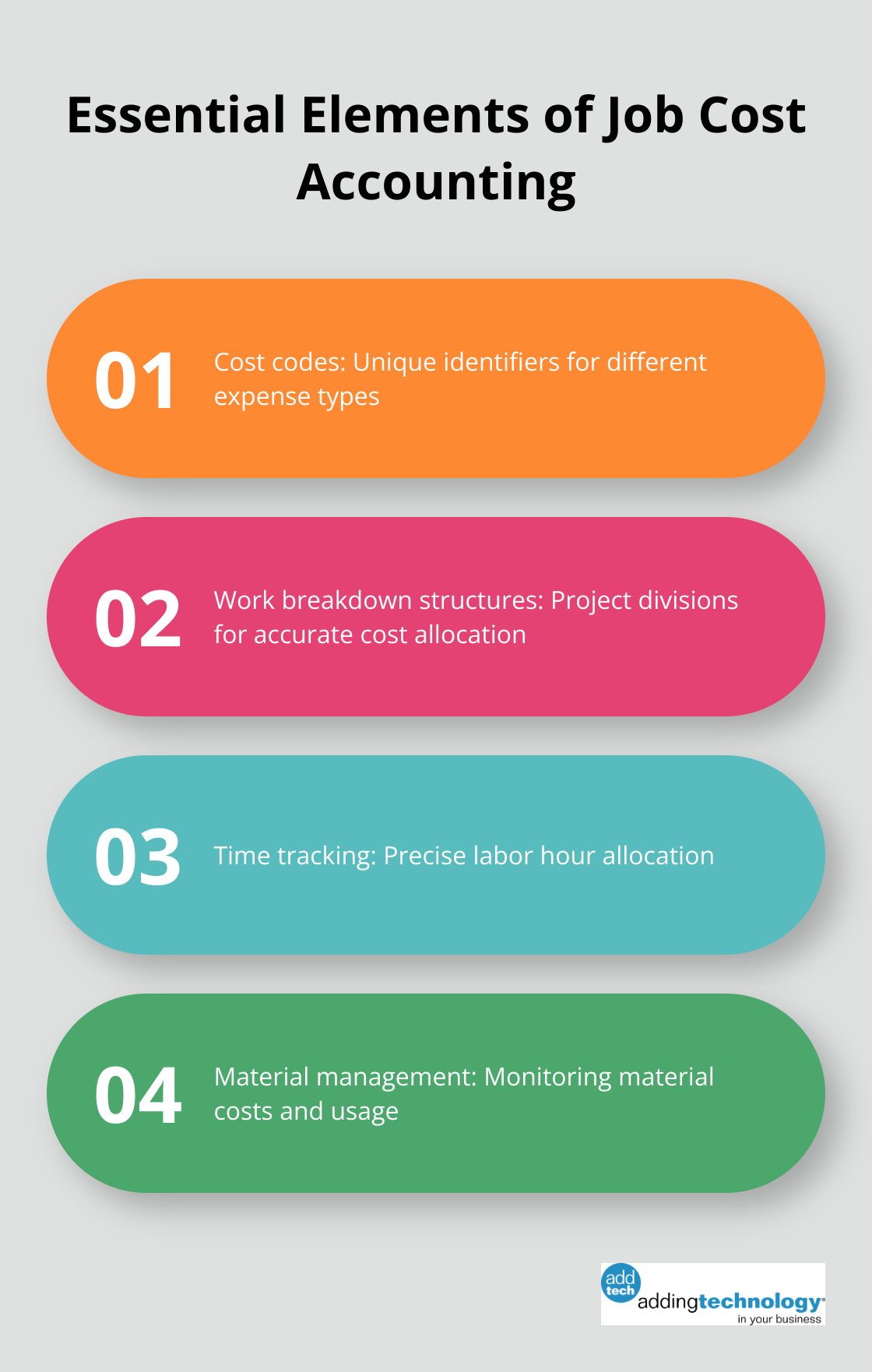
At adding technology, we understand the critical role of job cost accounting in construction projects.
Job cost accounting in construction is the backbone of financial management for builders and contractors. It allows for precise tracking of expenses, accurate bidding, and improved profitability.
This blog post will guide you through the essentials of implementing and mastering job cost accounting in your construction business.
Job cost accounting in construction forms the backbone of financial management for builders and contractors. This specialized system tracks and allocates costs to specific projects, enabling precise expense tracking, accurate bidding, and improved profitability.
The core elements of job cost accounting include:

Job cost accounting accurately tracks all costs associated with a job, including labor, materials, and overheads.
Job cost accounting differs from traditional accounting by focusing on individual projects rather than overall company finances. This project-centric approach allows construction companies to:
To effectively implement job cost accounting in your construction business:
QuickBooks Online is a widely used accounting software that simplifies financial management for small and mid-sized construction businesses.
Proper job cost accounting can transform construction businesses. It provides actionable insights that drive profitability and efficiency. Companies that master this discipline often see significant improvements in project outcomes and overall financial health.
As we move forward, we’ll explore the process of implementing effective job cost accounting systems, including software selection and integration with other business processes.
The foundation of a robust job cost accounting system is powerful, industry-specific software. Construction-focused solutions offer features tailored to the unique needs of builders and contractors. These platforms typically include basic functionality for job costing, invoicing, and contract management, as well as dashboards for project management and financial reporting.
When choosing software, consider scalability, ease of use, and integration capabilities. A cloud-based solution allows for real-time updates and remote access (essential in today’s mobile work environment). A survey revealed that 68% of construction firms reported using software for project financials, indicating improved project visibility after implementing specialized software.

Effective cost coding forms the backbone of accurate job costing. Develop a comprehensive cost code structure that aligns with your business processes and project types. The Construction Specifications Institute’s MasterFormat provides a standardized coding system widely used in the industry.
Start with broad categories such as labor, materials, and equipment, then break these down into more specific subcategories. For example, under labor, you might have separate codes for carpenters, electricians, and plumbers. Consistency is key – ensure all team members understand and use the codes correctly.
Job cost accounting should not exist in isolation. Integrate it with other key business processes for maximum efficiency. This includes:
For construction companies looking to streamline their financial processes and ensure compliance, expert services can provide valuable support. Adding Technology, for instance, offers specialized accounting and financial management services tailored for the construction industry. Their structured approach includes renovating accounting systems, implementing real-time job costing, and integrating advanced technology solutions.
The implementation of an effective job cost accounting system requires time and effort, but the benefits in improved financial control and profitability are substantial. In the next section, we’ll explore best practices for maintaining accurate job costing once your system is in place.
Accurate job costing forms the foundation of financial success in construction. The first step to master job costing involves the implementation of a system for meticulous cost tracking. This system must capture every expense and allocate it to the correct job and cost code. Construction job costing accurately tracks all costs associated with a job, including labor, materials, and overheads, providing a detailed breakdown of expenses.
To achieve high accuracy, construction companies should invest in mobile time-tracking apps for field workers. These tools enable employees to log hours and materials used directly from the job site (reducing errors and delays in data entry). For material costs, a barcode scanning system can track inventory usage automatically.
Change orders can significantly impact a project’s profitability. A recent study found that change orders resulting from surges in material costs were the most prevalent cause of project delays, with 59% of projects experiencing delays ranging from 10% to 30%. Without proper management, these changes can quickly erode profit margins.

Construction companies should implement a strict change order process that requires client approval before any additional work begins. Digital tools can create, track, and approve change orders in real-time. This approach not only ensures compensation for extra work but also provides a clear audit trail for dispute resolution.
Cost analysis should not wait until the end of a project. Weekly or bi-weekly cost analyses help identify discrepancies or overruns early. This proactive approach allows for adjustments before small issues become major problems.
Custom reports that compare actual costs to estimated costs for each cost code prove invaluable. Companies should look for trends or patterns in overruns – certain types of work might consistently go over budget. This information can refine the estimating process for future projects.
Modern construction accounting software plays a vital role in accurate job costing. These tools automate many aspects of cost tracking and analysis, reducing human error and providing real-time insights. When selecting software, companies should consider scalability, ease of use, and integration capabilities with existing systems.
Cloud-based solutions offer real-time updates and remote access, essential features in today’s mobile work environment.
For construction companies looking to streamline their financial processes and ensure compliance, expert services can provide valuable support. Adding Technology, for instance, offers specialized accounting and financial management services tailored for the construction industry. Their structured approach includes renovating accounting systems, implementing real-time job costing, and integrating advanced technology solutions.
Job cost accounting in construction transforms how businesses operate. It provides detailed insights into project costs, enables accurate bidding, and improves profitability. Companies that master this discipline position themselves for success in a competitive industry.
Implementing job cost accounting requires a commitment to accuracy and continuous improvement. We at Adding Technology offer expert services tailored for the construction industry. Our approach to renovating accounting systems and implementing real-time job costing can significantly improve operational efficiency and financial performance.
Adding Technology helps construction businesses build a solid financial foundation that supports growth and success. Job cost accounting in construction is more than tracking numbers; it provides insights for informed decisions and improved project outcomes. Those who embrace this essential financial discipline will thrive as the industry evolves.









At adding technology, we know you want to focus on what you do best as a contractor. In order to do that, you need a proactive back office crew who has financial expertise in your industry.
The problem is that managing and understanding key financial compliance details for your business is a distraction when you want to spend your time focused on building your business (and our collective future).
We understand that there is an art to what contractors do, and financial worries can disrupt the creative process and quality of work. We know that many contractors struggle with messy books, lack of realtime financial visibility, and the stress of compliance issues. These challenges can lead to frustration, overwhelm, and fear that distracts from their core business.
That's where we come in. We're not just accountants; we're part of your crew. We renovate your books, implement cutting-edge technology, and provide you with the real-time job costing and financial insights you need to make informed decisions. Our services are designed to give you peace of mind, allowing you to focus on what you do best - creating and building.
Here’s how we do it:
Schedule a conversation today, and in the meantime, download the Contractor’s Blueprint for Financial Success: A Step by-Step Guide to Maximizing Profits in Construction.” So you can stop worrying about accounting, technology, and compliance details and be free to hammer out success in the field.